University Report: Consumer Perception of Saudi-Made Products
VerifiedAdded on 2022/11/30
|16
|3672
|177
Report
AI Summary
This report delves into the critical issue of consumer perception regarding locally manufactured products in Saudi Arabia. The research aims to identify the relationship between consumer perception and the purchase of locally made products, with the goal of boosting the national economy and encouraging consumers to support local businesses. The study, based on a survey of 200 individuals, investigates why Saudi Arabian consumers often favor foreign goods, a trend that negatively impacts the country's economy. The report covers the research objectives, questions, literature review, methodology, data analysis, limitations, and recommendations. Key findings reveal that a significant portion of consumers prefer foreign products due to perceptions of superior quality and reputation. The study also explores demographic influences, such as age and gender, on purchasing behavior, and considers factors like product safety, durability, and brand recognition. This research provides valuable insights into consumer preferences and their impact on the local market, offering recommendations to improve the competitiveness and appeal of Saudi-made products. The study also includes a detailed literature review of the factors influencing consumer perception, including both internal and external influences. The report emphasizes the need to educate consumers about the benefits of local products and the overall economic implications of their purchasing choices. The findings suggest that increasing the appeal and quality of local products, along with effective marketing strategies, can shift consumer preferences and strengthen the national economy. This report is available on Desklib, a platform offering AI-powered study tools.

Evaluating consumer`s perception of nationally manufactured products
University
Word count
University
Word count
Paraphrase This Document
Need a fresh take? Get an instant paraphrase of this document with our AI Paraphraser
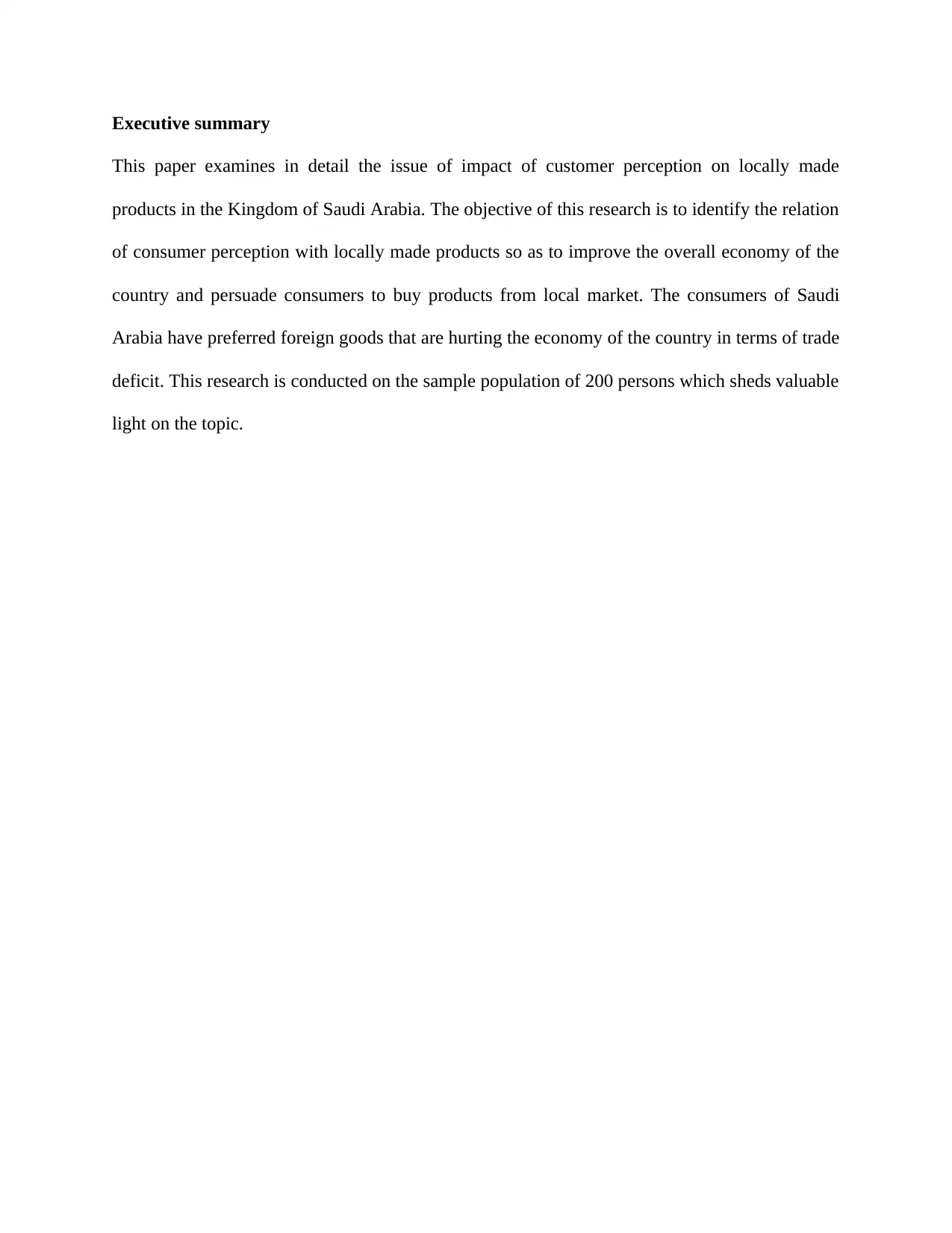
Executive summary
This paper examines in detail the issue of impact of customer perception on locally made
products in the Kingdom of Saudi Arabia. The objective of this research is to identify the relation
of consumer perception with locally made products so as to improve the overall economy of the
country and persuade consumers to buy products from local market. The consumers of Saudi
Arabia have preferred foreign goods that are hurting the economy of the country in terms of trade
deficit. This research is conducted on the sample population of 200 persons which sheds valuable
light on the topic.
This paper examines in detail the issue of impact of customer perception on locally made
products in the Kingdom of Saudi Arabia. The objective of this research is to identify the relation
of consumer perception with locally made products so as to improve the overall economy of the
country and persuade consumers to buy products from local market. The consumers of Saudi
Arabia have preferred foreign goods that are hurting the economy of the country in terms of trade
deficit. This research is conducted on the sample population of 200 persons which sheds valuable
light on the topic.
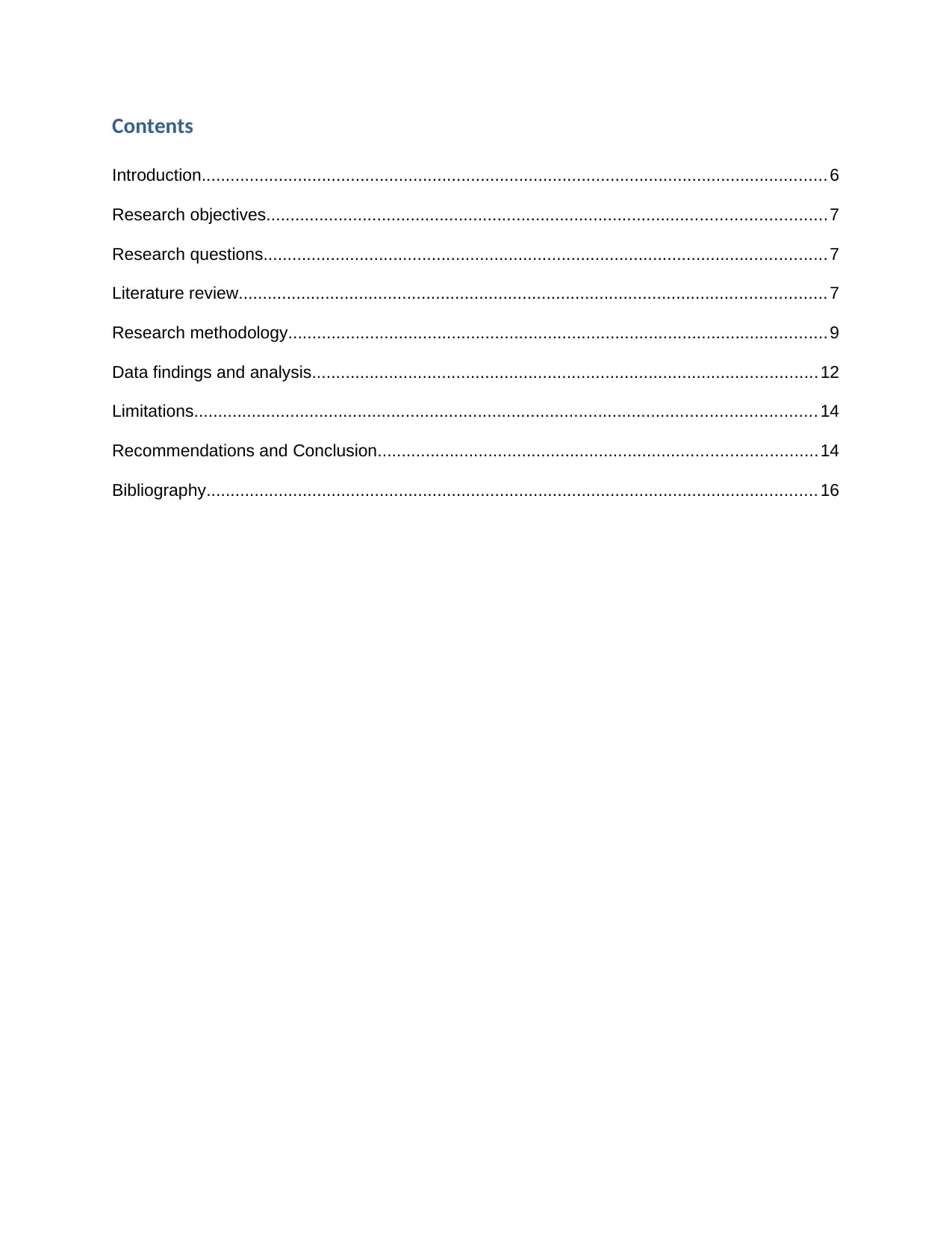
Contents
Introduction.................................................................................................................................. 6
Research objectives....................................................................................................................7
Research questions..................................................................................................................... 7
Literature review.......................................................................................................................... 7
Research methodology................................................................................................................ 9
Data findings and analysis.........................................................................................................12
Limitations................................................................................................................................. 14
Recommendations and Conclusion...........................................................................................14
Bibliography............................................................................................................................... 16
Introduction.................................................................................................................................. 6
Research objectives....................................................................................................................7
Research questions..................................................................................................................... 7
Literature review.......................................................................................................................... 7
Research methodology................................................................................................................ 9
Data findings and analysis.........................................................................................................12
Limitations................................................................................................................................. 14
Recommendations and Conclusion...........................................................................................14
Bibliography............................................................................................................................... 16
⊘ This is a preview!⊘
Do you want full access?
Subscribe today to unlock all pages.

Trusted by 1+ million students worldwide
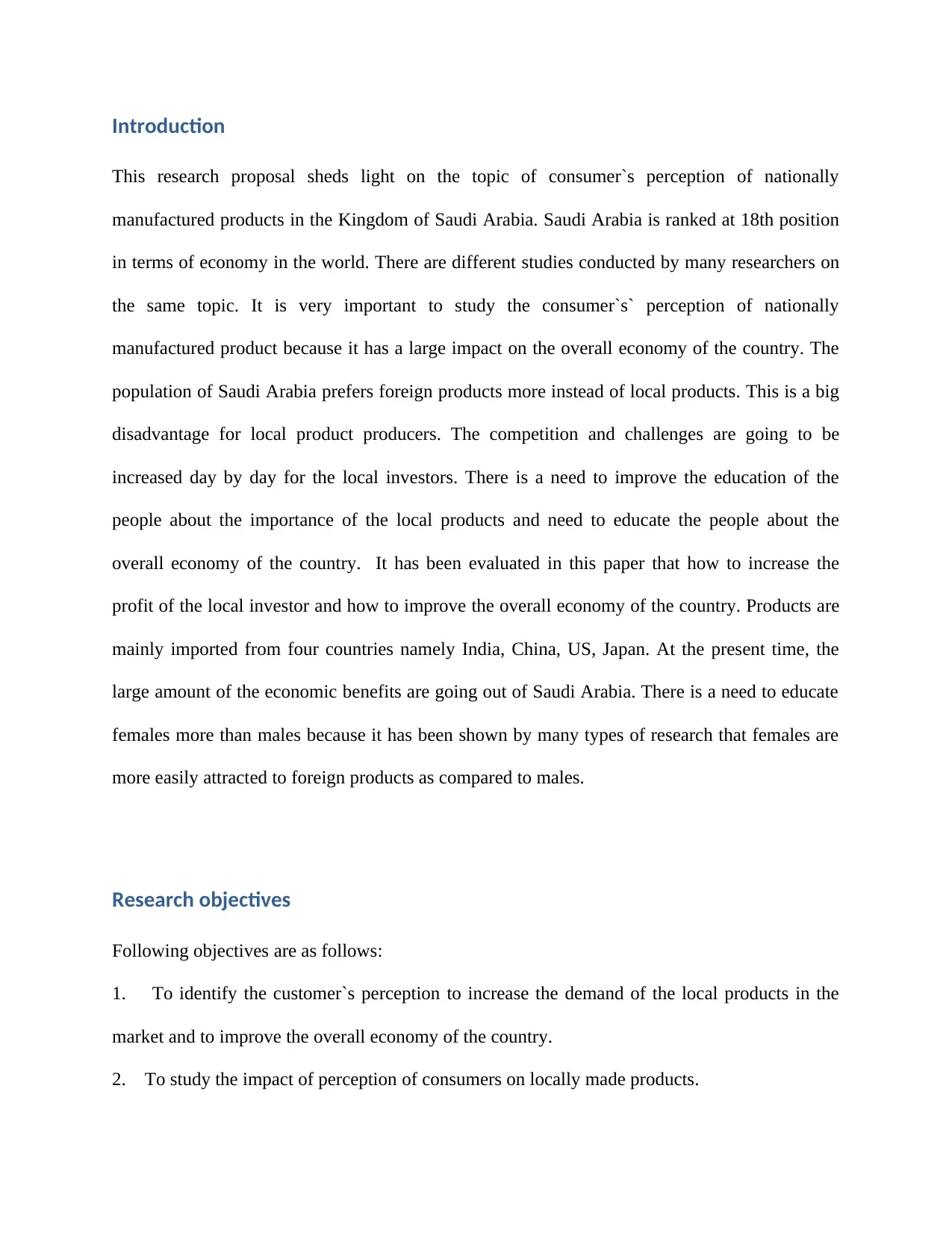
Introduction
This research proposal sheds light on the topic of consumer`s perception of nationally
manufactured products in the Kingdom of Saudi Arabia. Saudi Arabia is ranked at 18th position
in terms of economy in the world. There are different studies conducted by many researchers on
the same topic. It is very important to study the consumer`s` perception of nationally
manufactured product because it has a large impact on the overall economy of the country. The
population of Saudi Arabia prefers foreign products more instead of local products. This is a big
disadvantage for local product producers. The competition and challenges are going to be
increased day by day for the local investors. There is a need to improve the education of the
people about the importance of the local products and need to educate the people about the
overall economy of the country. It has been evaluated in this paper that how to increase the
profit of the local investor and how to improve the overall economy of the country. Products are
mainly imported from four countries namely India, China, US, Japan. At the present time, the
large amount of the economic benefits are going out of Saudi Arabia. There is a need to educate
females more than males because it has been shown by many types of research that females are
more easily attracted to foreign products as compared to males.
Research objectives
Following objectives are as follows:
1. To identify the customer`s perception to increase the demand of the local products in the
market and to improve the overall economy of the country.
2. To study the impact of perception of consumers on locally made products.
This research proposal sheds light on the topic of consumer`s perception of nationally
manufactured products in the Kingdom of Saudi Arabia. Saudi Arabia is ranked at 18th position
in terms of economy in the world. There are different studies conducted by many researchers on
the same topic. It is very important to study the consumer`s` perception of nationally
manufactured product because it has a large impact on the overall economy of the country. The
population of Saudi Arabia prefers foreign products more instead of local products. This is a big
disadvantage for local product producers. The competition and challenges are going to be
increased day by day for the local investors. There is a need to improve the education of the
people about the importance of the local products and need to educate the people about the
overall economy of the country. It has been evaluated in this paper that how to increase the
profit of the local investor and how to improve the overall economy of the country. Products are
mainly imported from four countries namely India, China, US, Japan. At the present time, the
large amount of the economic benefits are going out of Saudi Arabia. There is a need to educate
females more than males because it has been shown by many types of research that females are
more easily attracted to foreign products as compared to males.
Research objectives
Following objectives are as follows:
1. To identify the customer`s perception to increase the demand of the local products in the
market and to improve the overall economy of the country.
2. To study the impact of perception of consumers on locally made products.
Paraphrase This Document
Need a fresh take? Get an instant paraphrase of this document with our AI Paraphraser
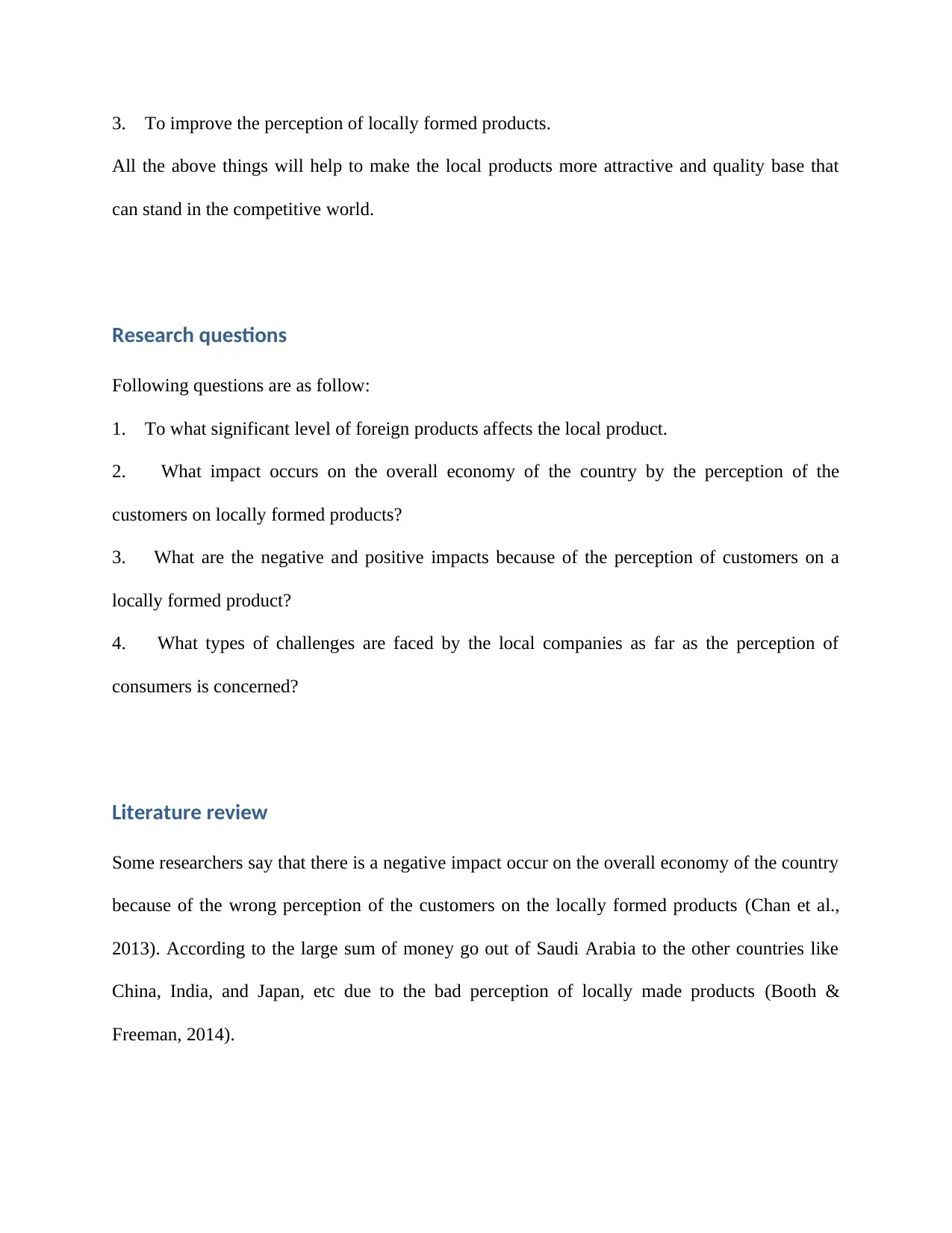
3. To improve the perception of locally formed products.
All the above things will help to make the local products more attractive and quality base that
can stand in the competitive world.
Research questions
Following questions are as follow:
1. To what significant level of foreign products affects the local product.
2. What impact occurs on the overall economy of the country by the perception of the
customers on locally formed products?
3. What are the negative and positive impacts because of the perception of customers on a
locally formed product?
4. What types of challenges are faced by the local companies as far as the perception of
consumers is concerned?
Literature review
Some researchers say that there is a negative impact occur on the overall economy of the country
because of the wrong perception of the customers on the locally formed products (Chan et al.,
2013). According to the large sum of money go out of Saudi Arabia to the other countries like
China, India, and Japan, etc due to the bad perception of locally made products (Booth &
Freeman, 2014).
All the above things will help to make the local products more attractive and quality base that
can stand in the competitive world.
Research questions
Following questions are as follow:
1. To what significant level of foreign products affects the local product.
2. What impact occurs on the overall economy of the country by the perception of the
customers on locally formed products?
3. What are the negative and positive impacts because of the perception of customers on a
locally formed product?
4. What types of challenges are faced by the local companies as far as the perception of
consumers is concerned?
Literature review
Some researchers say that there is a negative impact occur on the overall economy of the country
because of the wrong perception of the customers on the locally formed products (Chan et al.,
2013). According to the large sum of money go out of Saudi Arabia to the other countries like
China, India, and Japan, etc due to the bad perception of locally made products (Booth &
Freeman, 2014).
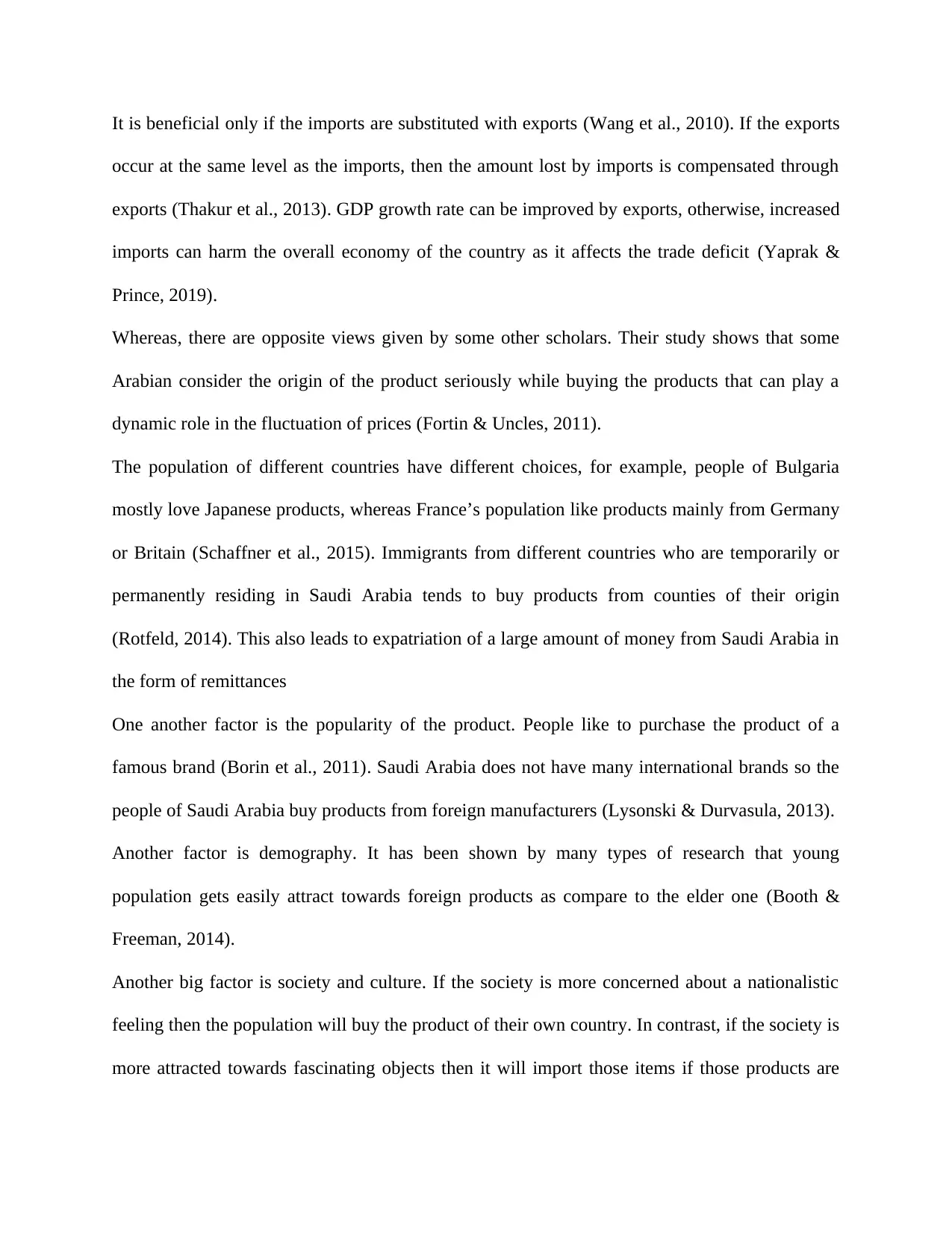
It is beneficial only if the imports are substituted with exports (Wang et al., 2010). If the exports
occur at the same level as the imports, then the amount lost by imports is compensated through
exports (Thakur et al., 2013). GDP growth rate can be improved by exports, otherwise, increased
imports can harm the overall economy of the country as it affects the trade deficit (Yaprak &
Prince, 2019).
Whereas, there are opposite views given by some other scholars. Their study shows that some
Arabian consider the origin of the product seriously while buying the products that can play a
dynamic role in the fluctuation of prices (Fortin & Uncles, 2011).
The population of different countries have different choices, for example, people of Bulgaria
mostly love Japanese products, whereas France’s population like products mainly from Germany
or Britain (Schaffner et al., 2015). Immigrants from different countries who are temporarily or
permanently residing in Saudi Arabia tends to buy products from counties of their origin
(Rotfeld, 2014). This also leads to expatriation of a large amount of money from Saudi Arabia in
the form of remittances
One another factor is the popularity of the product. People like to purchase the product of a
famous brand (Borin et al., 2011). Saudi Arabia does not have many international brands so the
people of Saudi Arabia buy products from foreign manufacturers (Lysonski & Durvasula, 2013).
Another factor is demography. It has been shown by many types of research that young
population gets easily attract towards foreign products as compare to the elder one (Booth &
Freeman, 2014).
Another big factor is society and culture. If the society is more concerned about a nationalistic
feeling then the population will buy the product of their own country. In contrast, if the society is
more attracted towards fascinating objects then it will import those items if those products are
occur at the same level as the imports, then the amount lost by imports is compensated through
exports (Thakur et al., 2013). GDP growth rate can be improved by exports, otherwise, increased
imports can harm the overall economy of the country as it affects the trade deficit (Yaprak &
Prince, 2019).
Whereas, there are opposite views given by some other scholars. Their study shows that some
Arabian consider the origin of the product seriously while buying the products that can play a
dynamic role in the fluctuation of prices (Fortin & Uncles, 2011).
The population of different countries have different choices, for example, people of Bulgaria
mostly love Japanese products, whereas France’s population like products mainly from Germany
or Britain (Schaffner et al., 2015). Immigrants from different countries who are temporarily or
permanently residing in Saudi Arabia tends to buy products from counties of their origin
(Rotfeld, 2014). This also leads to expatriation of a large amount of money from Saudi Arabia in
the form of remittances
One another factor is the popularity of the product. People like to purchase the product of a
famous brand (Borin et al., 2011). Saudi Arabia does not have many international brands so the
people of Saudi Arabia buy products from foreign manufacturers (Lysonski & Durvasula, 2013).
Another factor is demography. It has been shown by many types of research that young
population gets easily attract towards foreign products as compare to the elder one (Booth &
Freeman, 2014).
Another big factor is society and culture. If the society is more concerned about a nationalistic
feeling then the population will buy the product of their own country. In contrast, if the society is
more attracted towards fascinating objects then it will import those items if those products are
⊘ This is a preview!⊘
Do you want full access?
Subscribe today to unlock all pages.

Trusted by 1+ million students worldwide
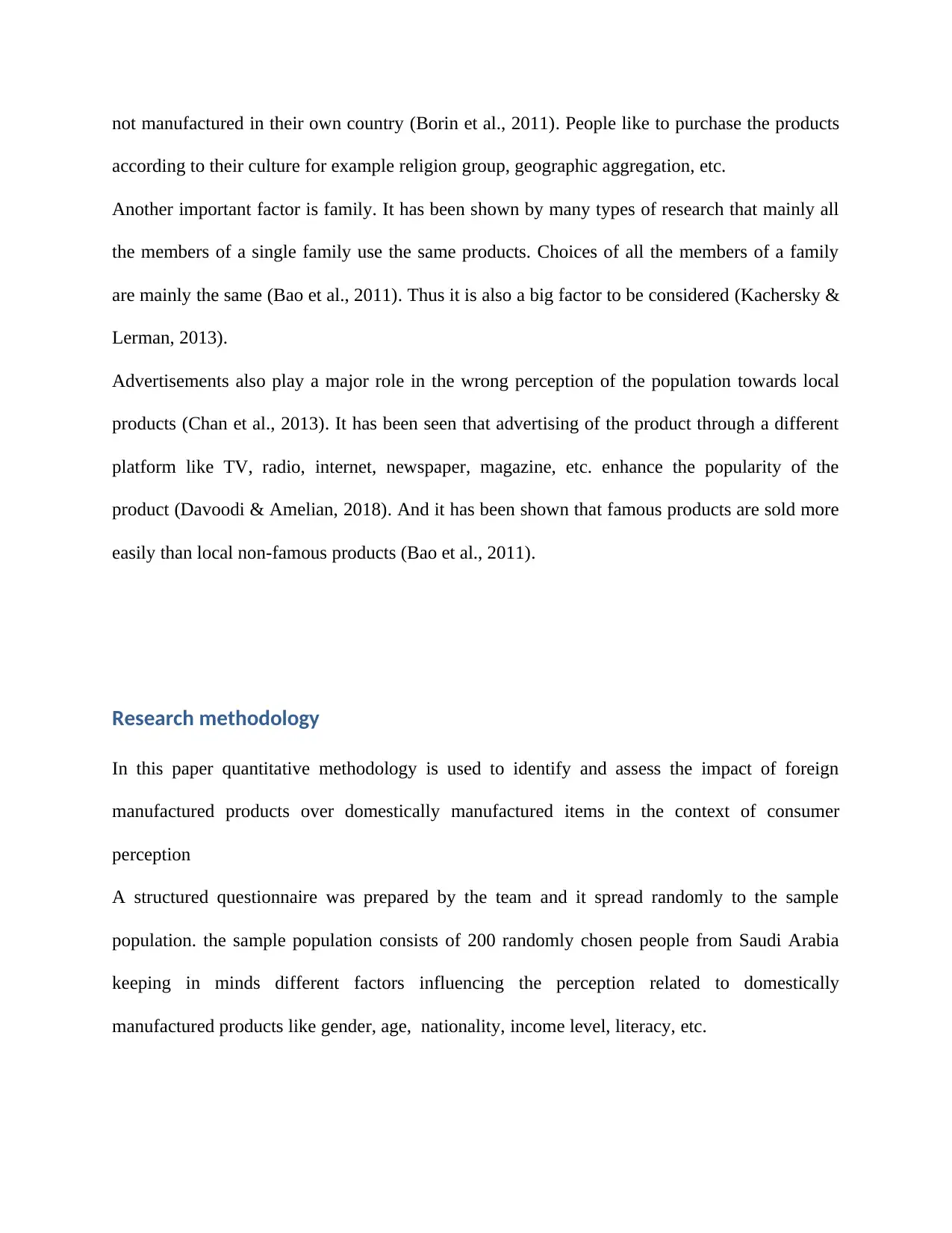
not manufactured in their own country (Borin et al., 2011). People like to purchase the products
according to their culture for example religion group, geographic aggregation, etc.
Another important factor is family. It has been shown by many types of research that mainly all
the members of a single family use the same products. Choices of all the members of a family
are mainly the same (Bao et al., 2011). Thus it is also a big factor to be considered (Kachersky &
Lerman, 2013).
Advertisements also play a major role in the wrong perception of the population towards local
products (Chan et al., 2013). It has been seen that advertising of the product through a different
platform like TV, radio, internet, newspaper, magazine, etc. enhance the popularity of the
product (Davoodi & Amelian, 2018). And it has been shown that famous products are sold more
easily than local non-famous products (Bao et al., 2011).
Research methodology
In this paper quantitative methodology is used to identify and assess the impact of foreign
manufactured products over domestically manufactured items in the context of consumer
perception
A structured questionnaire was prepared by the team and it spread randomly to the sample
population. the sample population consists of 200 randomly chosen people from Saudi Arabia
keeping in minds different factors influencing the perception related to domestically
manufactured products like gender, age, nationality, income level, literacy, etc.
according to their culture for example religion group, geographic aggregation, etc.
Another important factor is family. It has been shown by many types of research that mainly all
the members of a single family use the same products. Choices of all the members of a family
are mainly the same (Bao et al., 2011). Thus it is also a big factor to be considered (Kachersky &
Lerman, 2013).
Advertisements also play a major role in the wrong perception of the population towards local
products (Chan et al., 2013). It has been seen that advertising of the product through a different
platform like TV, radio, internet, newspaper, magazine, etc. enhance the popularity of the
product (Davoodi & Amelian, 2018). And it has been shown that famous products are sold more
easily than local non-famous products (Bao et al., 2011).
Research methodology
In this paper quantitative methodology is used to identify and assess the impact of foreign
manufactured products over domestically manufactured items in the context of consumer
perception
A structured questionnaire was prepared by the team and it spread randomly to the sample
population. the sample population consists of 200 randomly chosen people from Saudi Arabia
keeping in minds different factors influencing the perception related to domestically
manufactured products like gender, age, nationality, income level, literacy, etc.
Paraphrase This Document
Need a fresh take? Get an instant paraphrase of this document with our AI Paraphraser
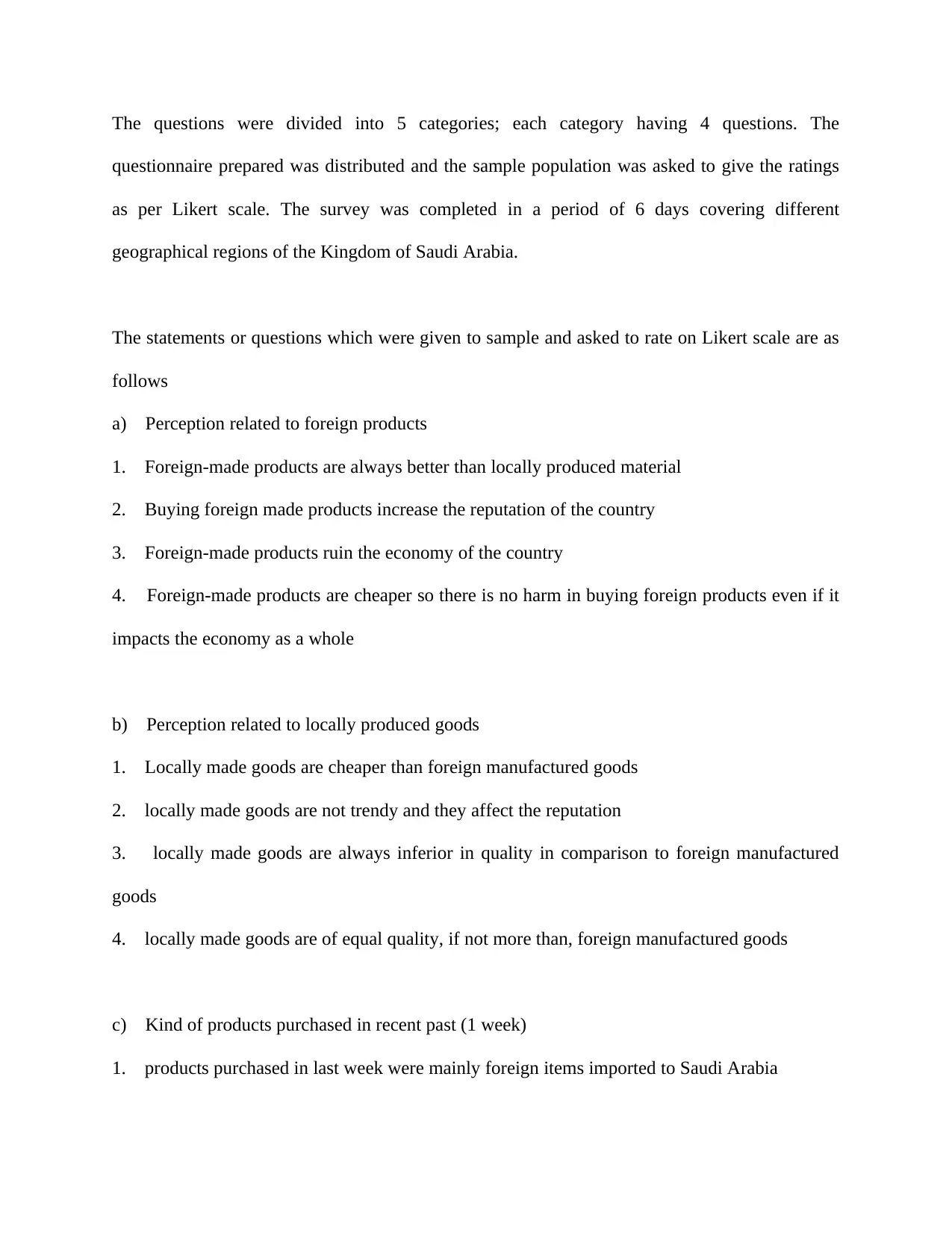
The questions were divided into 5 categories; each category having 4 questions. The
questionnaire prepared was distributed and the sample population was asked to give the ratings
as per Likert scale. The survey was completed in a period of 6 days covering different
geographical regions of the Kingdom of Saudi Arabia.
The statements or questions which were given to sample and asked to rate on Likert scale are as
follows
a) Perception related to foreign products
1. Foreign-made products are always better than locally produced material
2. Buying foreign made products increase the reputation of the country
3. Foreign-made products ruin the economy of the country
4. Foreign-made products are cheaper so there is no harm in buying foreign products even if it
impacts the economy as a whole
b) Perception related to locally produced goods
1. Locally made goods are cheaper than foreign manufactured goods
2. locally made goods are not trendy and they affect the reputation
3. locally made goods are always inferior in quality in comparison to foreign manufactured
goods
4. locally made goods are of equal quality, if not more than, foreign manufactured goods
c) Kind of products purchased in recent past (1 week)
1. products purchased in last week were mainly foreign items imported to Saudi Arabia
questionnaire prepared was distributed and the sample population was asked to give the ratings
as per Likert scale. The survey was completed in a period of 6 days covering different
geographical regions of the Kingdom of Saudi Arabia.
The statements or questions which were given to sample and asked to rate on Likert scale are as
follows
a) Perception related to foreign products
1. Foreign-made products are always better than locally produced material
2. Buying foreign made products increase the reputation of the country
3. Foreign-made products ruin the economy of the country
4. Foreign-made products are cheaper so there is no harm in buying foreign products even if it
impacts the economy as a whole
b) Perception related to locally produced goods
1. Locally made goods are cheaper than foreign manufactured goods
2. locally made goods are not trendy and they affect the reputation
3. locally made goods are always inferior in quality in comparison to foreign manufactured
goods
4. locally made goods are of equal quality, if not more than, foreign manufactured goods
c) Kind of products purchased in recent past (1 week)
1. products purchased in last week were mainly foreign items imported to Saudi Arabia
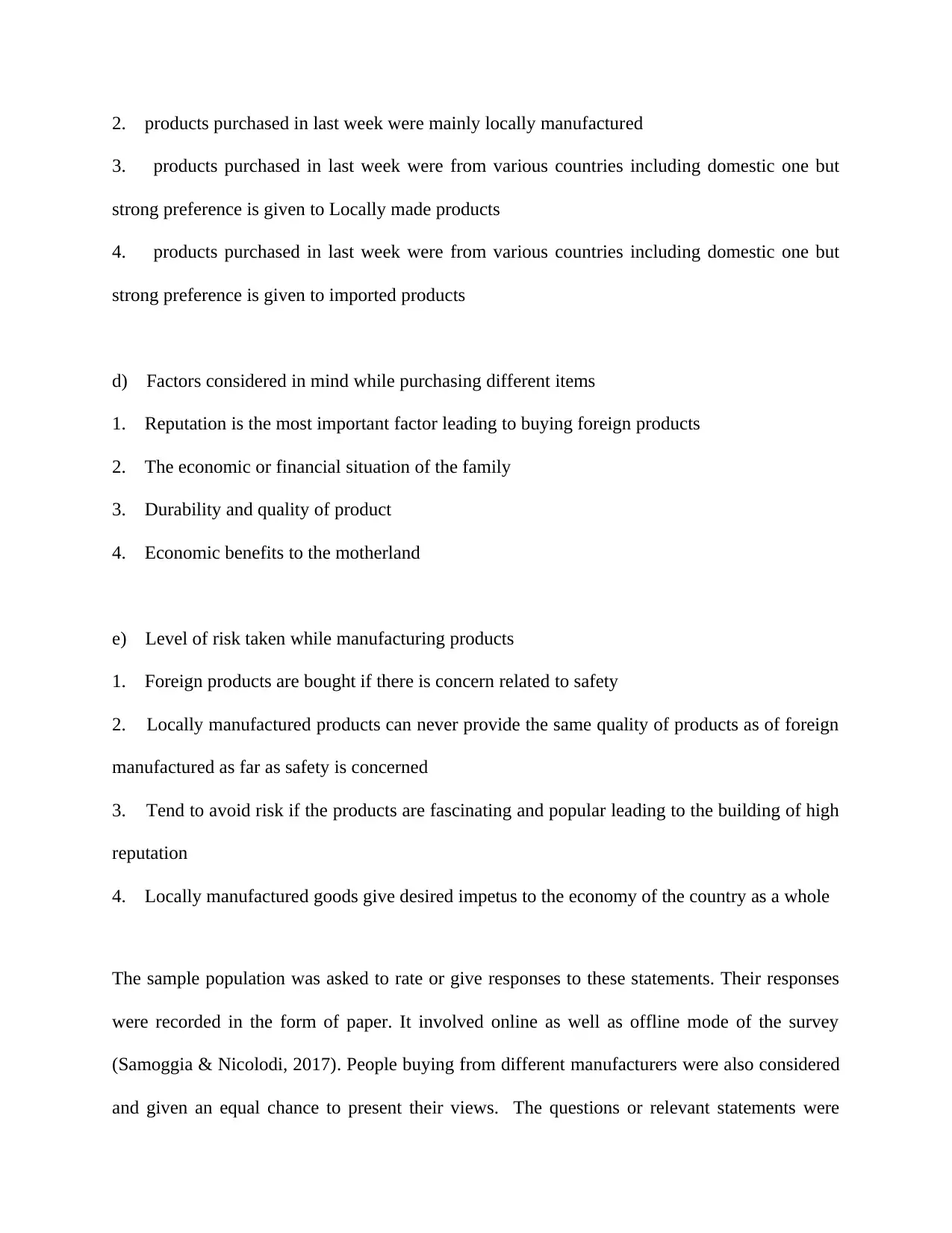
2. products purchased in last week were mainly locally manufactured
3. products purchased in last week were from various countries including domestic one but
strong preference is given to Locally made products
4. products purchased in last week were from various countries including domestic one but
strong preference is given to imported products
d) Factors considered in mind while purchasing different items
1. Reputation is the most important factor leading to buying foreign products
2. The economic or financial situation of the family
3. Durability and quality of product
4. Economic benefits to the motherland
e) Level of risk taken while manufacturing products
1. Foreign products are bought if there is concern related to safety
2. Locally manufactured products can never provide the same quality of products as of foreign
manufactured as far as safety is concerned
3. Tend to avoid risk if the products are fascinating and popular leading to the building of high
reputation
4. Locally manufactured goods give desired impetus to the economy of the country as a whole
The sample population was asked to rate or give responses to these statements. Their responses
were recorded in the form of paper. It involved online as well as offline mode of the survey
(Samoggia & Nicolodi, 2017). People buying from different manufacturers were also considered
and given an equal chance to present their views. The questions or relevant statements were
3. products purchased in last week were from various countries including domestic one but
strong preference is given to Locally made products
4. products purchased in last week were from various countries including domestic one but
strong preference is given to imported products
d) Factors considered in mind while purchasing different items
1. Reputation is the most important factor leading to buying foreign products
2. The economic or financial situation of the family
3. Durability and quality of product
4. Economic benefits to the motherland
e) Level of risk taken while manufacturing products
1. Foreign products are bought if there is concern related to safety
2. Locally manufactured products can never provide the same quality of products as of foreign
manufactured as far as safety is concerned
3. Tend to avoid risk if the products are fascinating and popular leading to the building of high
reputation
4. Locally manufactured goods give desired impetus to the economy of the country as a whole
The sample population was asked to rate or give responses to these statements. Their responses
were recorded in the form of paper. It involved online as well as offline mode of the survey
(Samoggia & Nicolodi, 2017). People buying from different manufacturers were also considered
and given an equal chance to present their views. The questions or relevant statements were
⊘ This is a preview!⊘
Do you want full access?
Subscribe today to unlock all pages.

Trusted by 1+ million students worldwide
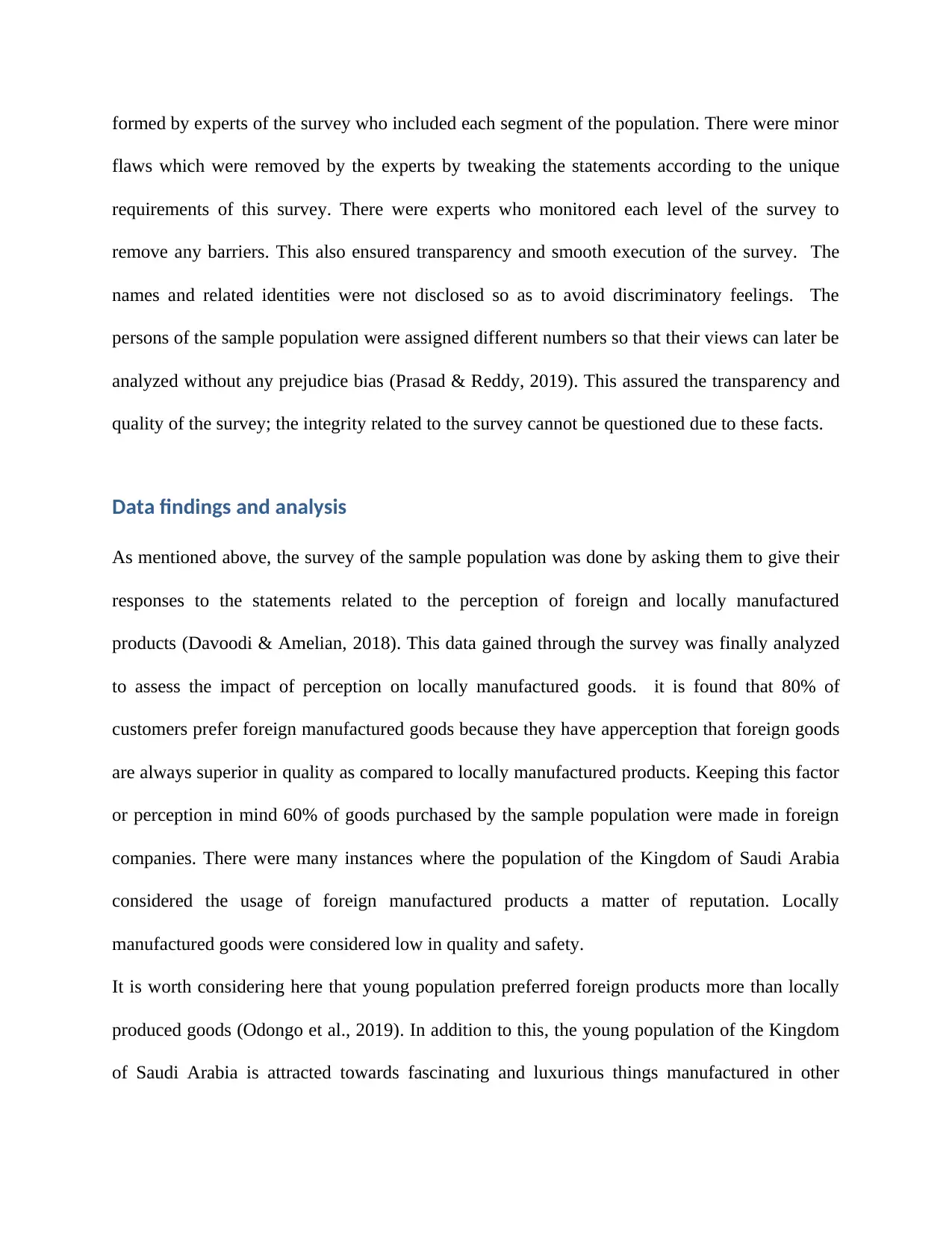
formed by experts of the survey who included each segment of the population. There were minor
flaws which were removed by the experts by tweaking the statements according to the unique
requirements of this survey. There were experts who monitored each level of the survey to
remove any barriers. This also ensured transparency and smooth execution of the survey. The
names and related identities were not disclosed so as to avoid discriminatory feelings. The
persons of the sample population were assigned different numbers so that their views can later be
analyzed without any prejudice bias (Prasad & Reddy, 2019). This assured the transparency and
quality of the survey; the integrity related to the survey cannot be questioned due to these facts.
Data findings and analysis
As mentioned above, the survey of the sample population was done by asking them to give their
responses to the statements related to the perception of foreign and locally manufactured
products (Davoodi & Amelian, 2018). This data gained through the survey was finally analyzed
to assess the impact of perception on locally manufactured goods. it is found that 80% of
customers prefer foreign manufactured goods because they have apperception that foreign goods
are always superior in quality as compared to locally manufactured products. Keeping this factor
or perception in mind 60% of goods purchased by the sample population were made in foreign
companies. There were many instances where the population of the Kingdom of Saudi Arabia
considered the usage of foreign manufactured products a matter of reputation. Locally
manufactured goods were considered low in quality and safety.
It is worth considering here that young population preferred foreign products more than locally
produced goods (Odongo et al., 2019). In addition to this, the young population of the Kingdom
of Saudi Arabia is attracted towards fascinating and luxurious things manufactured in other
flaws which were removed by the experts by tweaking the statements according to the unique
requirements of this survey. There were experts who monitored each level of the survey to
remove any barriers. This also ensured transparency and smooth execution of the survey. The
names and related identities were not disclosed so as to avoid discriminatory feelings. The
persons of the sample population were assigned different numbers so that their views can later be
analyzed without any prejudice bias (Prasad & Reddy, 2019). This assured the transparency and
quality of the survey; the integrity related to the survey cannot be questioned due to these facts.
Data findings and analysis
As mentioned above, the survey of the sample population was done by asking them to give their
responses to the statements related to the perception of foreign and locally manufactured
products (Davoodi & Amelian, 2018). This data gained through the survey was finally analyzed
to assess the impact of perception on locally manufactured goods. it is found that 80% of
customers prefer foreign manufactured goods because they have apperception that foreign goods
are always superior in quality as compared to locally manufactured products. Keeping this factor
or perception in mind 60% of goods purchased by the sample population were made in foreign
companies. There were many instances where the population of the Kingdom of Saudi Arabia
considered the usage of foreign manufactured products a matter of reputation. Locally
manufactured goods were considered low in quality and safety.
It is worth considering here that young population preferred foreign products more than locally
produced goods (Odongo et al., 2019). In addition to this, the young population of the Kingdom
of Saudi Arabia is attracted towards fascinating and luxurious things manufactured in other
Paraphrase This Document
Need a fresh take? Get an instant paraphrase of this document with our AI Paraphraser
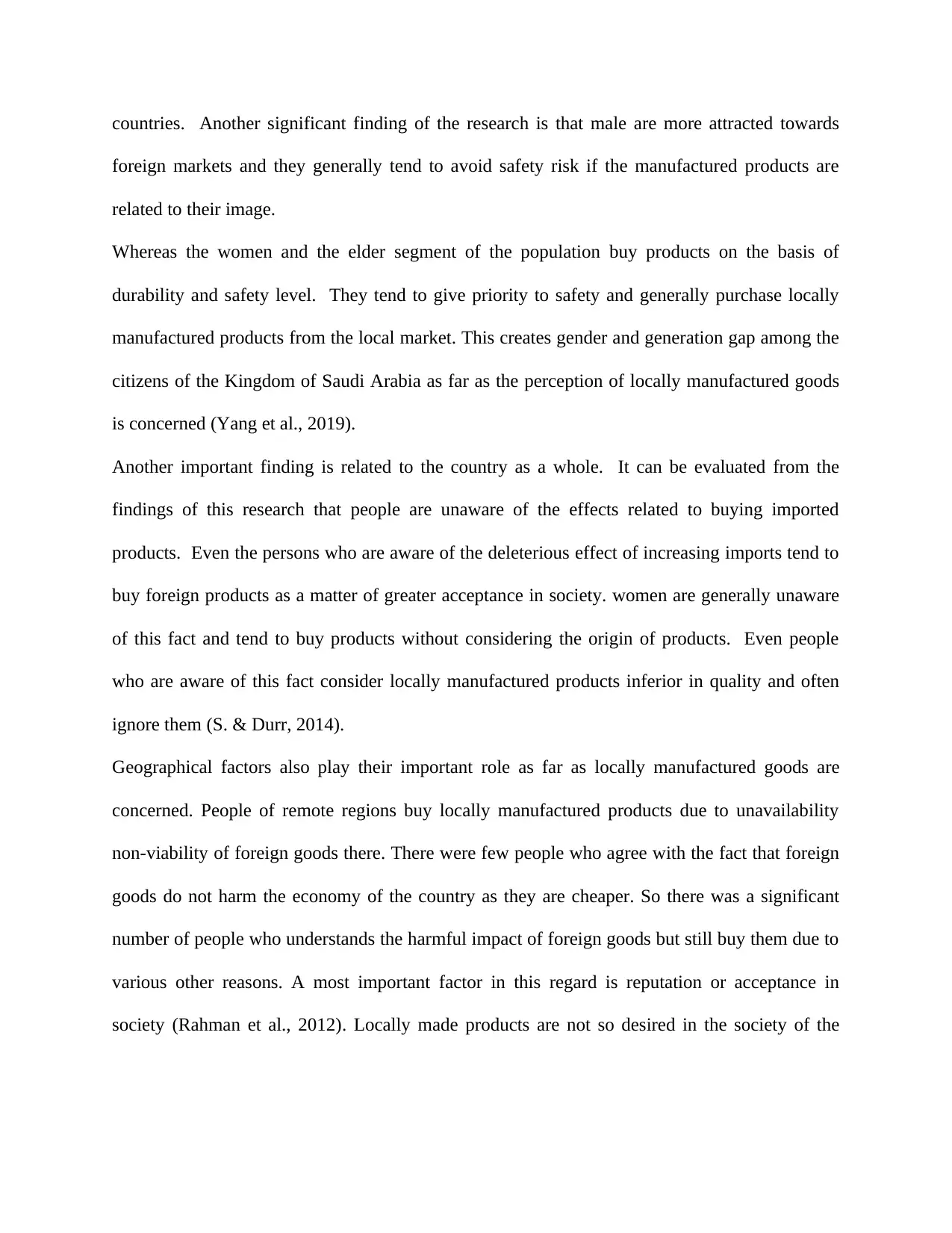
countries. Another significant finding of the research is that male are more attracted towards
foreign markets and they generally tend to avoid safety risk if the manufactured products are
related to their image.
Whereas the women and the elder segment of the population buy products on the basis of
durability and safety level. They tend to give priority to safety and generally purchase locally
manufactured products from the local market. This creates gender and generation gap among the
citizens of the Kingdom of Saudi Arabia as far as the perception of locally manufactured goods
is concerned (Yang et al., 2019).
Another important finding is related to the country as a whole. It can be evaluated from the
findings of this research that people are unaware of the effects related to buying imported
products. Even the persons who are aware of the deleterious effect of increasing imports tend to
buy foreign products as a matter of greater acceptance in society. women are generally unaware
of this fact and tend to buy products without considering the origin of products. Even people
who are aware of this fact consider locally manufactured products inferior in quality and often
ignore them (S. & Durr, 2014).
Geographical factors also play their important role as far as locally manufactured goods are
concerned. People of remote regions buy locally manufactured products due to unavailability
non-viability of foreign goods there. There were few people who agree with the fact that foreign
goods do not harm the economy of the country as they are cheaper. So there was a significant
number of people who understands the harmful impact of foreign goods but still buy them due to
various other reasons. A most important factor in this regard is reputation or acceptance in
society (Rahman et al., 2012). Locally made products are not so desired in the society of the
foreign markets and they generally tend to avoid safety risk if the manufactured products are
related to their image.
Whereas the women and the elder segment of the population buy products on the basis of
durability and safety level. They tend to give priority to safety and generally purchase locally
manufactured products from the local market. This creates gender and generation gap among the
citizens of the Kingdom of Saudi Arabia as far as the perception of locally manufactured goods
is concerned (Yang et al., 2019).
Another important finding is related to the country as a whole. It can be evaluated from the
findings of this research that people are unaware of the effects related to buying imported
products. Even the persons who are aware of the deleterious effect of increasing imports tend to
buy foreign products as a matter of greater acceptance in society. women are generally unaware
of this fact and tend to buy products without considering the origin of products. Even people
who are aware of this fact consider locally manufactured products inferior in quality and often
ignore them (S. & Durr, 2014).
Geographical factors also play their important role as far as locally manufactured goods are
concerned. People of remote regions buy locally manufactured products due to unavailability
non-viability of foreign goods there. There were few people who agree with the fact that foreign
goods do not harm the economy of the country as they are cheaper. So there was a significant
number of people who understands the harmful impact of foreign goods but still buy them due to
various other reasons. A most important factor in this regard is reputation or acceptance in
society (Rahman et al., 2012). Locally made products are not so desired in the society of the
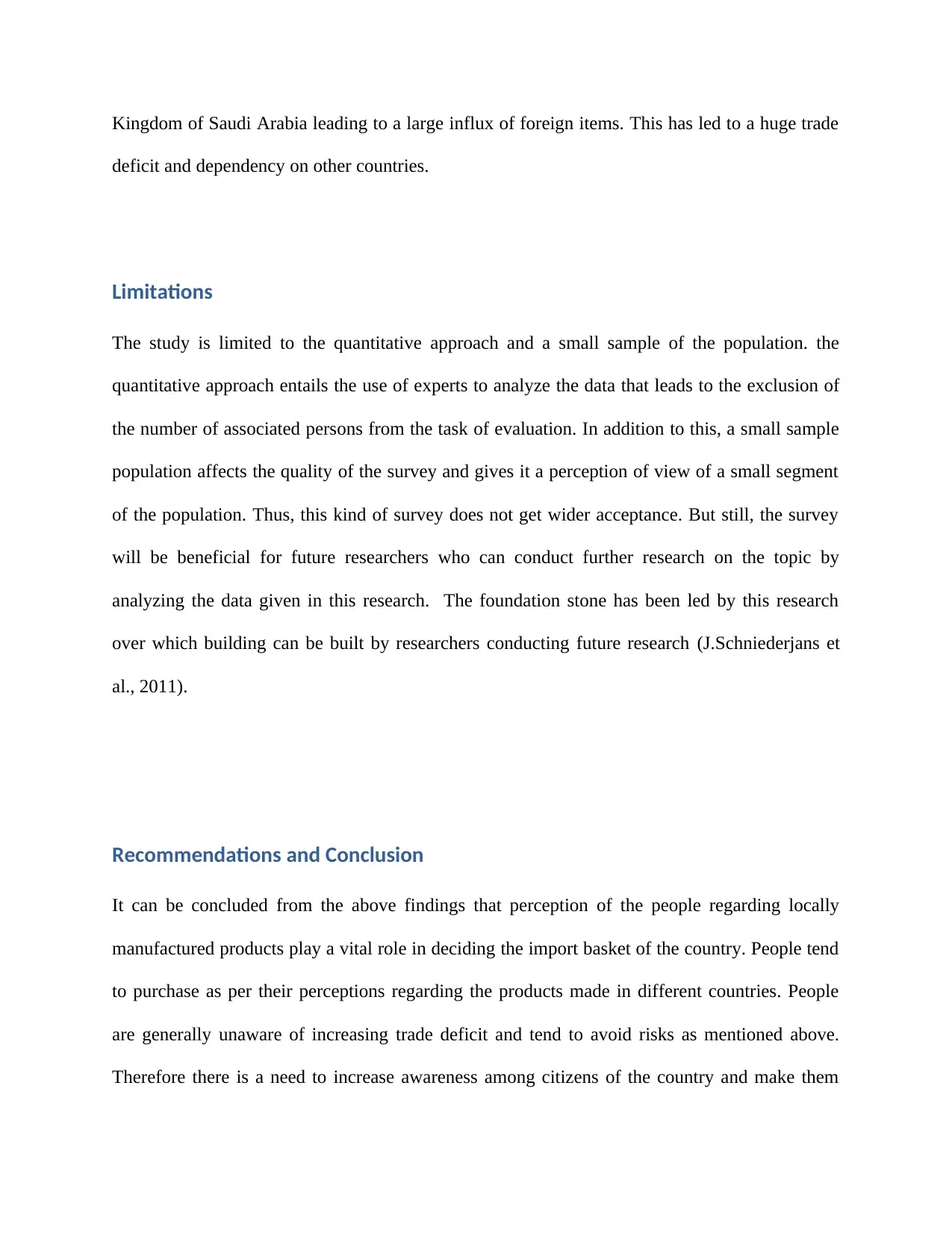
Kingdom of Saudi Arabia leading to a large influx of foreign items. This has led to a huge trade
deficit and dependency on other countries.
Limitations
The study is limited to the quantitative approach and a small sample of the population. the
quantitative approach entails the use of experts to analyze the data that leads to the exclusion of
the number of associated persons from the task of evaluation. In addition to this, a small sample
population affects the quality of the survey and gives it a perception of view of a small segment
of the population. Thus, this kind of survey does not get wider acceptance. But still, the survey
will be beneficial for future researchers who can conduct further research on the topic by
analyzing the data given in this research. The foundation stone has been led by this research
over which building can be built by researchers conducting future research (J.Schniederjans et
al., 2011).
Recommendations and Conclusion
It can be concluded from the above findings that perception of the people regarding locally
manufactured products play a vital role in deciding the import basket of the country. People tend
to purchase as per their perceptions regarding the products made in different countries. People
are generally unaware of increasing trade deficit and tend to avoid risks as mentioned above.
Therefore there is a need to increase awareness among citizens of the country and make them
deficit and dependency on other countries.
Limitations
The study is limited to the quantitative approach and a small sample of the population. the
quantitative approach entails the use of experts to analyze the data that leads to the exclusion of
the number of associated persons from the task of evaluation. In addition to this, a small sample
population affects the quality of the survey and gives it a perception of view of a small segment
of the population. Thus, this kind of survey does not get wider acceptance. But still, the survey
will be beneficial for future researchers who can conduct further research on the topic by
analyzing the data given in this research. The foundation stone has been led by this research
over which building can be built by researchers conducting future research (J.Schniederjans et
al., 2011).
Recommendations and Conclusion
It can be concluded from the above findings that perception of the people regarding locally
manufactured products play a vital role in deciding the import basket of the country. People tend
to purchase as per their perceptions regarding the products made in different countries. People
are generally unaware of increasing trade deficit and tend to avoid risks as mentioned above.
Therefore there is a need to increase awareness among citizens of the country and make them
⊘ This is a preview!⊘
Do you want full access?
Subscribe today to unlock all pages.

Trusted by 1+ million students worldwide
1 out of 16
Related Documents
Your All-in-One AI-Powered Toolkit for Academic Success.
+13062052269
info@desklib.com
Available 24*7 on WhatsApp / Email
![[object Object]](/_next/static/media/star-bottom.7253800d.svg)
Unlock your academic potential
Copyright © 2020–2025 A2Z Services. All Rights Reserved. Developed and managed by ZUCOL.





